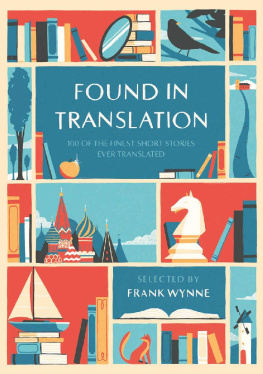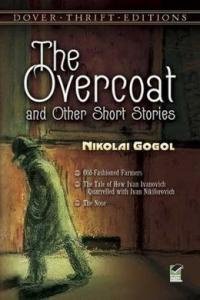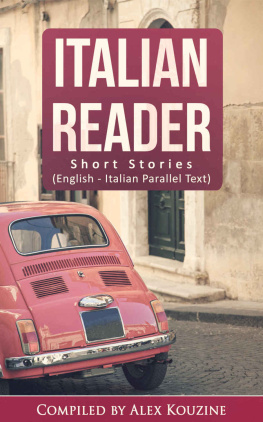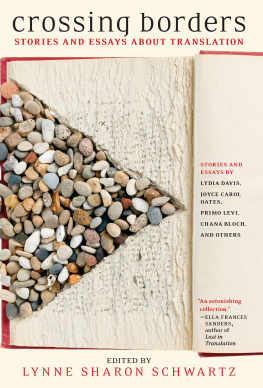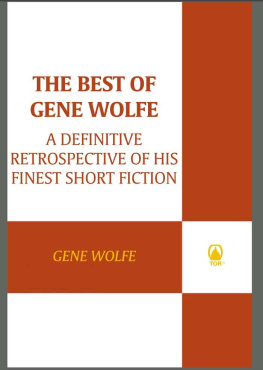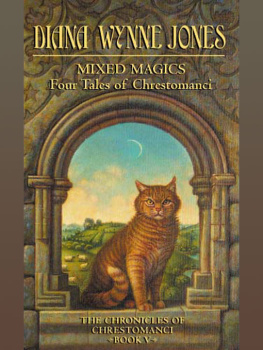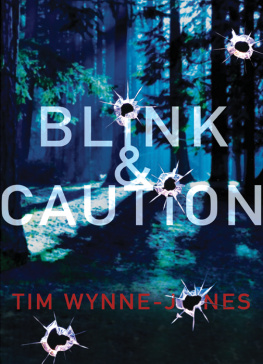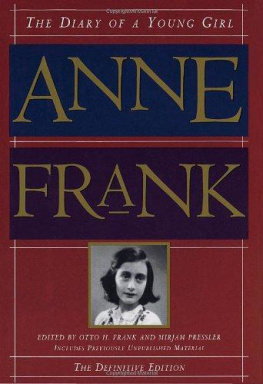Frank Wynne (ed.) - Found in Translation - 100 of the finest short stories ever translated
Here you can read online Frank Wynne (ed.) - Found in Translation - 100 of the finest short stories ever translated full text of the book (entire story) in english for free. Download pdf and epub, get meaning, cover and reviews about this ebook. year: 2018, publisher: Head of Zeus, genre: Detective and thriller. Description of the work, (preface) as well as reviews are available. Best literature library LitArk.com created for fans of good reading and offers a wide selection of genres:
Romance novel
Science fiction
Adventure
Detective
Science
History
Home and family
Prose
Art
Politics
Computer
Non-fiction
Religion
Business
Children
Humor
Choose a favorite category and find really read worthwhile books. Enjoy immersion in the world of imagination, feel the emotions of the characters or learn something new for yourself, make an fascinating discovery.
- Book:Found in Translation - 100 of the finest short stories ever translated
- Author:
- Publisher:Head of Zeus
- Genre:
- Year:2018
- Rating:4 / 5
- Favourites:Add to favourites
- Your mark:
- 80
- 1
- 2
- 3
- 4
- 5
Found in Translation - 100 of the finest short stories ever translated: summary, description and annotation
We offer to read an annotation, description, summary or preface (depends on what the author of the book "Found in Translation - 100 of the finest short stories ever translated" wrote himself). If you haven't found the necessary information about the book — write in the comments, we will try to find it.
Found in Translation - 100 of the finest short stories ever translated — read online for free the complete book (whole text) full work
Below is the text of the book, divided by pages. System saving the place of the last page read, allows you to conveniently read the book "Found in Translation - 100 of the finest short stories ever translated" online for free, without having to search again every time where you left off. Put a bookmark, and you can go to the page where you finished reading at any time.
Font size:
Interval:
Bookmark:
Frank Wynne
AN APOLLO BOOK
www.headofzeus.com
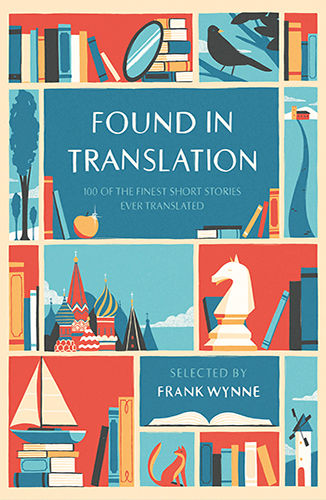 |
Without translation, we would be living in provinces bordering on silence. George Steiner
It is impossible to overstate the influence world literatures have had in defining each other. No culture exists in isolation; all writers are part of an intertwining braid.
Found in Translation brings together one hundred glittering diamonds of world literature, celebrating not only the original texts themselves but also the art of translation. From Azerbaijan to Uzbekistan, by way of China and Brazil, some of the greatest voices of world literature come together in thunderous chorus. If the authors include prize winners, some of the translators are equally famous D. H. Lawrence and Edith Wharton translate classic Italian short stories, and Victoria Hislop has taken her first venture into translation with the only short story written by Constantine P. Cavafy.
This exciting, original and brilliantly varied collection of stories takes the reader literally on a journey: its the perfect way to travel the globe, and to travel in time.
In memory of David Miller
I have a memory of the first short story that made an impression on me that is so vivid, so visceral that the hair on the back of my neck still prickles thirty years later. I would have been fourteen, perhaps fifteen, when I read it, sitting in Miss Collins French class, in Sligo Grammar School. She had told us to read En mer by Guy de Maupassant, a brief story, no more than five pages long, whose sparse, plain language was just within the grasp of our rudimentary French. It is the simple story of an accident aboard a fishing trawler manned by two brothers. On their return to port, the net is almost lost in a heavy squall and the younger brothers arm is trapped between the ropes and the gunwale. To save the arm would mean cutting the rope and losing the valuable net. The elder brother instead drops anchor and, eventually, the fishermen manage to free the arm, now shattered and horribly mangled. Gangrene quickly sets in. I can still remember sitting at my desk, reading the sentence where the younger brother began to cut his own arm. He cut carefully, painstakingly, slicing through the last tendons with a blade as sharp as a razor; soon there was nothing but a stump. I apologise for this spoiler, but an even greater emotional shock awaits the reader in the final sentences.
This was the story that first offered me a glimpse of the unique power of the short story. Maupassants tone is detached and unemotional, something that makes the horror all the more devastating. I began to devour short stories wherever I could find them I remember the profoundly unsettling feeling of reading Ian McEwans stories in First Love, Last Rites , and my first encounters with John Cheever and Flannery OConnor. Long before I was fortunate enough to stumble into a career as a translator or had an inkling of what such a peculiar shapeshifter might be translators introduced me to other masters of the genre: to Chekhov and Pushkin, Borges and Calvino. I discovered that a short story has the matchless ability to capture a mood or a moment, to halt time, to suspend the commonplace and imbue everyday objects with startling power. A short story can conjure a whole world in a handful of pages, it can be poignant, tragic, funny or surreal, it can leave a reader tearful, terrified or inexplicably serene, it can be as fleeting and unfinished as lives glimpsed from a moving train or as forensically precise as an autopsy report. In the words of the great American writer, Walter Mosley: A good short story asks a question that cant be answered in simple terms. And even if we come up with some understanding, years later, while glancing out of a window, the story still has the potential to return, to alter right there in our mind and change everything.
Although every language, as it emerges, develops an oral tradition of storytelling intended to entertain or edify countless anecdotes, parables and fables that range from the Book of Job to the folk tales told by Scheherazade to Sultan Shahriyar the short story as we know today is the most recent literary genre. It begins to flourish in the nineteenth century almost three hundred years after the novel spurred by the rise of literacy in industrialised countries and the appearance of magazines and periodicals eager to publish shorter fictions. As William Boyd succinctly puts it: The short story arrived fully fledged in the middle of the 19th century and by its end, in the shape of Anton Chekhov, had reached its apotheosis.
Even taking this narrow definition of a short story, the task of selecting one hundred from the countless stories translated from any language, from any country is to say the least a daunting task. So, when I was asked to edit this anthology I was both preposterously excited and utterly terrified. Obviously, it is impossible to read every story ; how then do you decide when you have read enough? Since an introduction is usually the last part of a book to be written, I now know the answer: you will never have read enough.
From the outset, I decided that I wanted to cast my net as widely as possible, to offer a glimpse of as many countries and cultures, as many languages as would fit between these covers and simultaneously to try to chart a course from the seventeenth century to short masterpieces of the twenty-first century. The usual suspects are here the Russians, the French and the Germans who (with the British and the Americans) dominated the short story form for almost a century but there are also stories from countries as varied as Guinea and Vietnam, and stories translated from Azerbaijani and Gikuyu. There are a dozen writers in these pages who have won the Nobel Prize for Literature and others who are all but unknown outside their homelands.
These, then, are the writers. But with the exception of those few authors who have translated their own work (Isak Dinesen, Ngg wa Thiongo), the words you are reading are those of translators. If, as Susan Sontag says, translation is the circulatory system of the worlds literatures, then translators are the beating heart that makes it possible for stories to flow beyond borders and across oceans. Their task is as simple as it may seem impossible: to quote Gnter Grass, Translation is that which transforms everything so that nothing changes. It is not a matter of finding equivalent words (since there is never an exact equivalence), but of weighing the weight and heft of words while striving to preserve the cadence and the rhythm of a sentence, to reinvent a pun, to produce a voice that lives on the page. Like a pianist transforming a written score into a performance of the Goldberg Variations , or an actor taking a play and becoming Hedda Gabler, a translator must interpret and perform, while hewing as closely as possible to the shape of the original. It is a process that is thrilling and frustrating, often challenging and always rewarding. The debt we owe to translators often goes unacknowledged; we talk about having read Tolstoy or Proust when actually we have read Constance Garnett or C.K. Scott Moncrieff. We talk about the style of Garca Marquez or Murakami, but the style we so admire owes much to Edith Grossman or Jay Rubin. All literature is a continuum, an intertwining of voices and languages, of dialects, and it is impossible to imagine the evolution of the English novel without the availability of translations. As Milan Kundera says: it was to Rabelais that Laurence Sterne was reacting, it was Sterne who set off Diderot, it was from Cervantes that Fielding drew constant inspiration, it was against Fielding that Stendhal measured himself, it was Flauberts tradition living on in Joyce, it was through his reflection on Joyce that Hermann Broch developed his own poetics of the novel, and it was Kafka who showed Garca Marquez the possibility of departing from tradition to write another way.
Font size:
Interval:
Bookmark:
Similar books «Found in Translation - 100 of the finest short stories ever translated»
Look at similar books to Found in Translation - 100 of the finest short stories ever translated. We have selected literature similar in name and meaning in the hope of providing readers with more options to find new, interesting, not yet read works.
Discussion, reviews of the book Found in Translation - 100 of the finest short stories ever translated and just readers' own opinions. Leave your comments, write what you think about the work, its meaning or the main characters. Specify what exactly you liked and what you didn't like, and why you think so.

